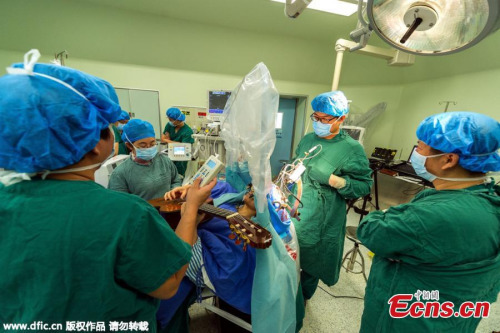
A patient plays the guitar while undergoing surgery on his head at a hospital in Shenzhen City, South China's Guangdong Province, Jan. 25, 2016. (Photo/IC)
As surgeons were busy boring a hole in his skull, a 57-year-old man plucked the delicate strains of "Romance De Amor" from his guitar.
It's not a fictional scenario. It happened earlier this week in an operating theater in the southern city of Shenzhen, as neurologists operated on a patient suffering from focal dystonia.
For the past days, images of Li, with his head immobilized by an elaborate arrangement of medical hardware, playing the guitar have been circulated on social media.
While some doubted publicity purposes of the medical team, Cai Xiaodong, chief neurosurgeon at Shenzhen No.2 People's Hospital, insisted that it was a necessary step of deep brain stimulation (DBS), one of the most advanced neurological treatments.
The new technique, combining neurology, neurosurgery and electrical engineering, allows doctors to implant tiny electrodes in patients' brains to affect abnormal cells, chemicals or impulses behind a number of neurological conditions such as tremors, dementia and, in Li's case, dystonia.
Once a classical guitarist, Li developed dystonia in his right hand two decades ago. The condition, sometimes known as "musician's cramp," has prevented him from playing guitar ever since, despite years of medication.
Cai decided that DBS was appropriate for Li, as it had little chance of causing paralysis, a common side-effect of brain surgery.
After Cai explained to Li how DBS works, the patient agreed to have the procedure.
Once the electrodes are in place, they deliver a weak but constant current that will reduce or eliminate his symptoms. The most challenging part of DBS is to locate precise spot in the brain. That's why patients must remain conscious during the procedure.
"It is essential for doctors to identify the exact spot where the electrodes will do the most good," Cai said. "We need to track the effects of the surgery in real time."
During the operation, Cai required Li to play the guitar and from time to time to describe what he was feeling.
As shown in a short video clip, Li was able to play immediately after four hours of surgery.
Li's right hand has recovered 80 percent of its function, and the remaining 20 percent might work too after a rehabilitation program.
Cai said DBS has been widely used to treat Parkinson's disease, but he claimed it was the first time the technique had been used to treat hand dystonia in China.
Despite Cai's enthusiasm, DBS is still far from being an instant therapy. The electrodes are powered by battery packs sewn into Li's left chest, and it requires follow-up surgeries every ten years to sustain energy for the devices.
Meanwhile, the cost of the surgery, as Cai said, is "far beyond the reach of many people."


















































